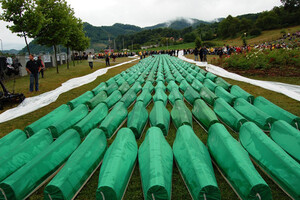At least 8,000 Bosniaks were killed then. How many tens of thousands of Ukrainians died from Russian bullets, bombs and rockets remains to be determined.

Thousands of citizens of Bosnia and Herzegovina took part in the through a forest in eastern Bosnia to commemorate the Srebrenica massacre in 1995, the only recognized genocide in Europe since World War II, AP NEWS reports.
A 100-kilometer-long human chain stretched along the route where men and teenagers from the predominantly Muslim Bosniak ethnic group tried to escape Srebrenica after it was captured by Bosnian Serb forces in the final days of the inter-ethnic war in the 1990s, only to be killed. .
“At some moments, in some places we passed by, I felt goosebumps running up my skin,” said Mircea Malic from the northeastern city of Tuzla. “It's hard to think about what the victims of the massacre went through, walking here and not knowing what was waiting for them around the corner.”
In July 1995, at least 8,000 Bosnian men were separated from their wives, mothers and sisters by Serb forces, driven into the forests around Srebrenica and killed.
Bosnian Serb soldiers dumped the victims' bodies in numerous mass graves scattered across the eastern part of the city, trying to hide the traces of the crime.
Every year on July 11, the anniversary of the 1995 genocide, newly identified victims are reburied in the large memorial cemetery near Sribnitsa, which is still expanding.
To date, the remains of more than 6,600 people have been found and buried. The remains of another 50 victims, recently found in mass graves and identified through DNA analysis, will be laid to rest on Monday. People lined up along Sarajevo's main street on Friday as a huge coffin truck drove past on its way to Srebrenica.
The truck stopped in front of the residence of the president of Bosnia and Herzegovina, where people, expressing their respect, placed flowers on the cloth that was covering him. Among them was Fatima Aldzic, whose son, husband and brother were killed in the massacre. Aldzic is still searching for their remains.
“Every year I come to say goodbye to the victims and it's hard — very hard,” Aldzic said before breaking down in tears. “It's hard to even witness what happened to us, let alone experience it for yourself.” fueled nationalist passions and territorial ambitions that pitted Bosnian Serbs against the country's two other main ethnic factions, Croats and Bosniaks.
This massacre has been declared genocide by international and national courts, but Serbian leaders in Bosnia and neighboring Serbia continue to downplay or even deny it, despite the undeniable evidence of what happened.
For Ukrainians, Bucha, Irpin, Chernihiv and, finally, Mariupol became bloody memorials. How many thousands or tens of thousands of their inhabitants died or were killed by the occupiers remains to be determined. And involve the aggressors and murderers in the response.




